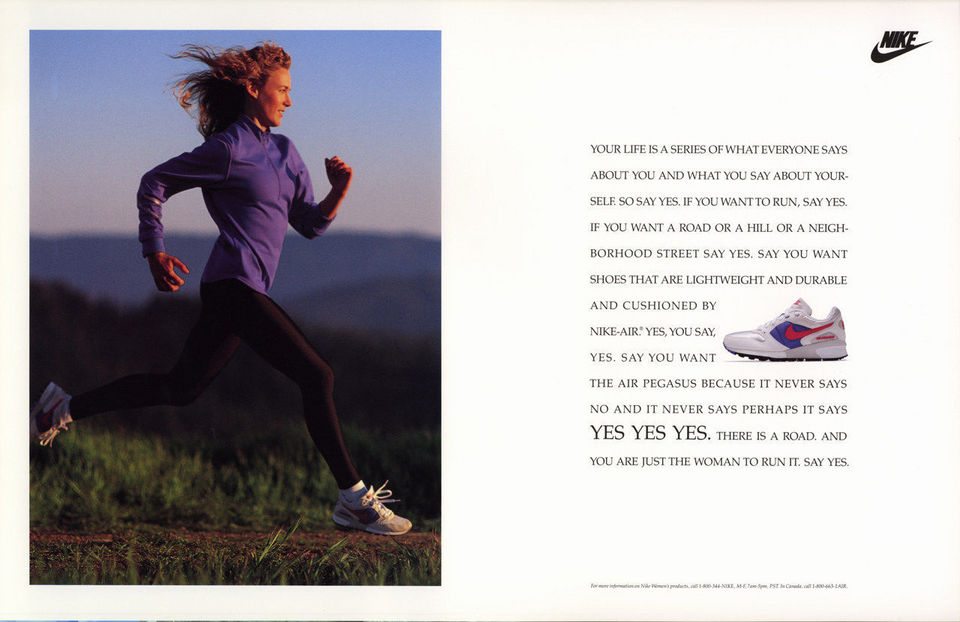By Allan Brettman
The Oregonian, Portland, Ore.
Peggy Olson is fiction. Janet Champ is real.
The AMC series “Mad Men” has launched its final season and one of its most memorable and revolutionary characters has been Olson, the pool secretary who rose to influential ad copywriter, played by Elisabeth Moss.
That was Janet Champ’s career trajectory when she worked at Wieden+Kennedy.
As company legend has it, W+K’s creative team was struggling with ads for its Nike women’s campaign in the early 1990s. Champ, then a secretary, asked to try her hand at copywriting.
The ads that followed from Champ and creative director Charlotte Moore are some of the most memorable in the long, lauded history between the Portland-based, independent ad agency and the world’s largest sporting goods company. On the occasion of its 33rd birthday last week, W+K put a spotlight on seven print ads from the campaign, posting them for a day along with other memorable work from early in the agency’s history.
Maureen O’Connor, a former ad agency copywriter and now director of Portland State University’s advertising program, remembers the Nike women’s campaign well. She said via email:
“It’s hard to overestimate just how significant and breakthrough the original Nike women’s campaign by Janet Champ and Charlotte Moore was. The idea that you didn’t need to let anyone but you define who you were was an aha moment for women. The elegance of the copy and layout have made the campaign so timeless that I still teach it in my classes. (I can’t be the only person who hears Molly Bloom’s soliloquy in “say YES YES YES”) And the work of Dove’s Campaign for Real Beauty and “Love Your Curls” and the Under Armour campaign (among others) still delivers this message…which you would hope we wouldn’t still need to be doing, but there it is. The message fights against a lot of cultural garbage out there.
“That original Nike women’s campaign spoke to a lot of women (like me) who were pre-Title IX girls and teens. We didn’t have much opportunity to play sports, even if we wanted to. Nike told us it wasn’t too late for us, and it surely wasn’t too late for our daughters. If you have never seen “If You Let Me Play” take a look at the spot. Pow!”
Speaking of that Under Armour campaign, a Portland branding consultant, Meredith Chase, played a key role in guiding the Baltimore-based sporting goods brand toward the introduction last year of its women’s campaign. Chase detected a “sea of sameness” in her research that led up to the campaign, launched with a much-talked-about video of ballerina Misty Copeland.
Chase, a former Nike marketing employee who is now a vice president of client strategy for the Portland agency Swift, also marveled at the Nike campaign of the early 1990s.
“It’s kind of amazing when you take a step back and take a look at what they were doing at that time,” Chase said. “It was really a blank canvas for them.
“Up until that time the advertising had been focusing on men using pro athletes from the field. These ads, using everyday people to tell the story, is trying to identify a voice for women. That was a really big task…these ads were very defining of what it means to be a woman.”
Update:
Scott Bedbury, Nike’s advertising director from 1987 to 1994, sends word that the women’s campaign credited to Janet Champ and Charlotte Moore actually is 25 years old.
Bedbury, who left Nike to be Starbucks’ senior vice president for marketing and brand development, writes:
Janet may have started as the receptionist, but she has proved herself to be one of the great creative writers of our time. Calling her work “copy” falls short. It’s poetry that still stops people in their tracks 25 years later. Repositioning Nike as a meaningful brand to women was a real challenge, probably the hardest we faced in the time I was there. The campaign was briefed in 1989, with the first work running in 1990. The seminal eight page “Born a Daughter” print insert broke in 1991. The P.L.A.Y. campaign, which promoted the value of sports to children, was briefed in 1993 and first ran in 1994.















































































































































































































































































































































































